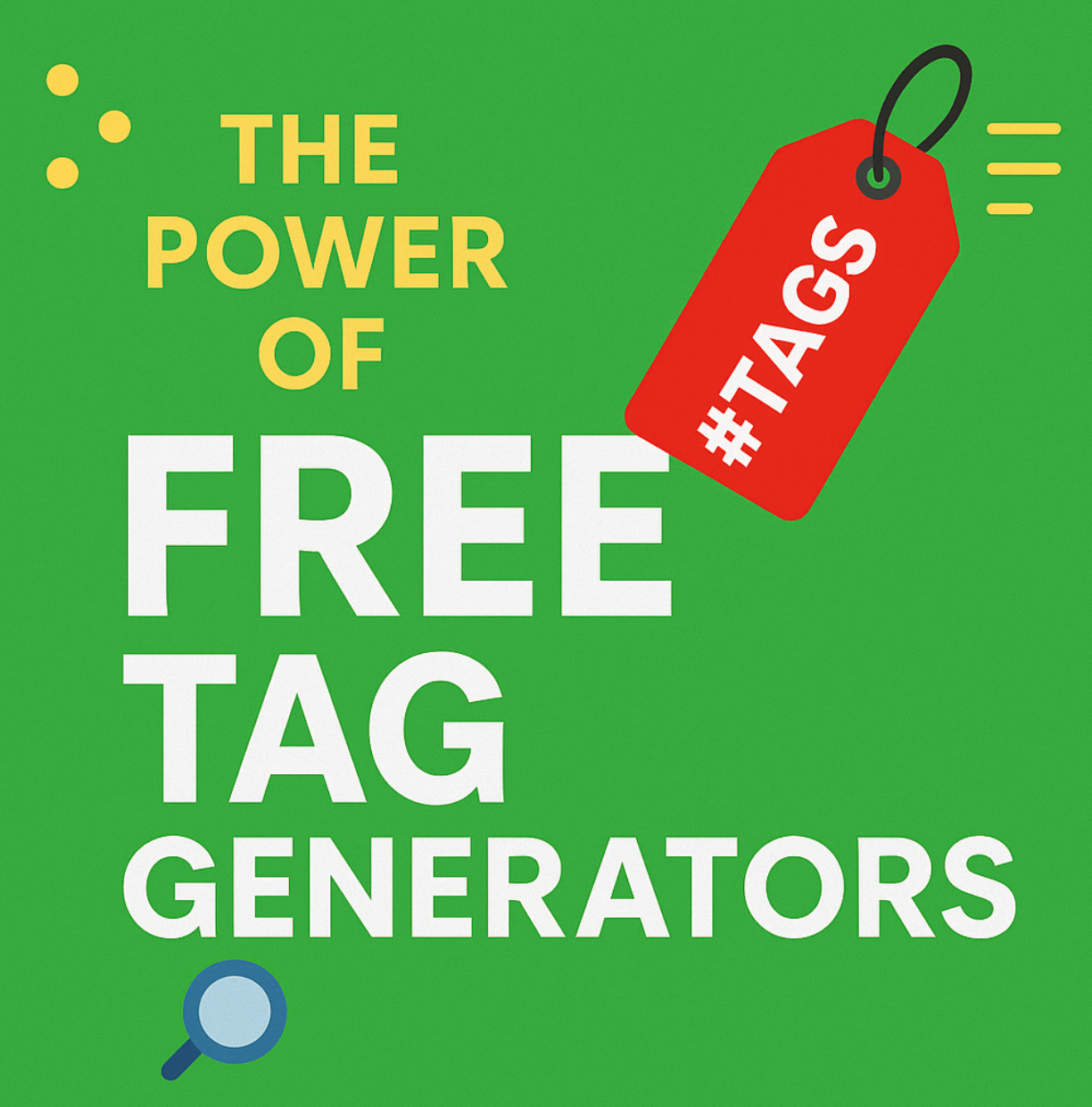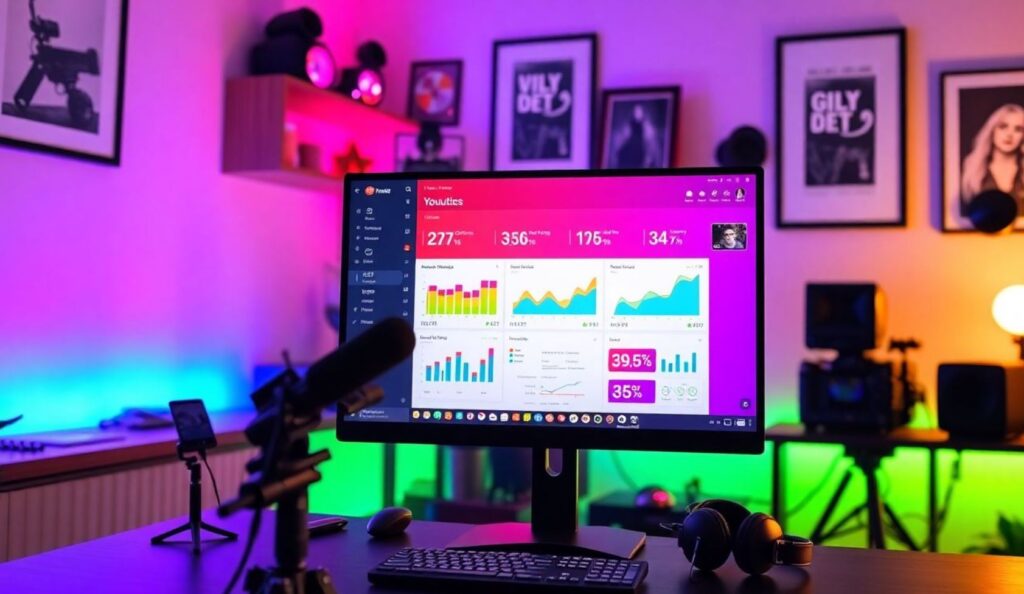Free tag generators are a digital marketer’s secret weapon. Whether you’re building a personal brand, growing a YouTube channel, or selling handmade jewelries online, the right tags can make all the difference in being seen or being buried. This is where tags come into play — keywords or phrases that categorize content, make it discoverable, and align it with user searches.
But crafting effective tags isn’t always intuitive. That’s where free tag generators become invaluable. These tools help creators, marketers, and entrepreneurs quickly generate relevant and optimized tags to boost reach and improve SEO (Search Engine Optimization). In this article, we’ll explore what tag generators are, how they work, the different types available, and how to use them strategically.
What is a Tag Generator?
A tag generator is a tool — often free and web-based — that suggests tags or keywords related to a specific topic, product, video, image, or post. By inputting a base keyword or topic, the generator analyzes popular search trends, related keywords, and user behavior to produce a list of relevant tags.
These tags can then be used across various platforms:
-
YouTube (video tags and description keywords)
-
Instagram/TikTok (hashtags)
-
Blog posts (meta tags, keywords)
-
E-commerce (product tags on Shopify, Etsy, Amazon, etc.)
-
SEO optimization (Google search tags, keyword-rich titles)
Why Tags Matter in Digital Content
Tags are more than just accessories — they’re strategic tools that influence how content is found and consumed. Here’s why they’re critical:
-
Increased Discoverability
Tags act as labels that help platforms understand and recommend your content. Good tagging helps your content surface in searches, suggestions, and trends. -
Targeted Audience Reach
Proper tags ensure your content reaches users who are actively searching for topics in your niche. They attract the right eyeballs. -
Improved SEO
Tags are key components of metadata that search engines crawl to rank pages and content. Keywords embedded through tags help improve search visibility. -
Categorization and Organization
Tags help organize content within platforms, making it easier for users to find related material.
Types of Free Tag Generators
Depending on your platform and content goals, different types of tag generators are available. Here are a few common ones:
1. YouTube Tag Generators
These tools analyze trending video content, YouTube’s algorithm, and search patterns to suggest video tags that boost visibility. Example tools:
-
Rapidtags.io
-
TubeBuddy (free version)
-
VidIQ (basic plan)
2. Hashtag Generators for Social Media
For platforms like Instagram, TikTok, or Twitter, hashtag generators analyze popularity, engagement rates, and trends to suggest high-performing tags. Examples:
-
All Hashtag
-
HashtagsForLikes
-
Inflact
3. SEO Keyword Generators
These go beyond surface-level tags to help websites and blogs rank higher on Google. Tools like:
-
Ubersuggest
-
Keyword Tool
-
AnswerThePublic
4. E-commerce Tag Generators
Platforms like Etsy, Amazon, and Shopify use tags to index products. E-commerce generators suggest tags based on market trends and search data. Tools include:
-
EtsyHunt
-
Keyword Tool for Amazon
-
Sale Samurai
How Do Tag Generators Work?
Most tag generators operate on a few key principles:
-
Keyword Analysis:
You input a seed keyword (e.g., “fitness workout”), and the tool pulls related searches, synonyms, and popular phrases. -
Search Engine Data Mining:
Many tools scrape real-time data from Google, YouTube, or platform-specific APIs to suggest trending or popular tags. -
Competitive Analysis:
Some generators also analyze competitors’ content and extract their most used tags to help you compete strategically. -
Machine Learning:
Advanced tools use AI to refine suggestions based on your industry, language patterns, and what’s currently performing well online.
Benefits of Using Free Tag Generators
Free tag generators come with a host of benefits, especially for beginners and budget-conscious creators:
-
Cost-Effective: You don’t need to spend on premium SEO tools to get started with effective tagging.
-
Time-Saving: Instantly receive tag suggestions instead of researching manually.
-
User-Friendly: Most are designed for ease of use — just plug in a word and get results.
-
Real-Time Relevance: Many generators provide current, trend-based suggestions rather than outdated ones.
Best Practices for Tag Usage
Using tag generators is only part of the strategy. To get the most out of tags, keep the following best practices in mind:
1. Use a Mix of Broad and Niche Tags
Include high-volume tags (e.g., #fitness) and specific long-tail tags (e.g., #homeworkoutforbeginners) to target both mass and niche audiences.
2. Avoid Overstuffing
Platforms like YouTube penalize excessive tagging. Stick to 5–15 highly relevant tags rather than stuffing 50 keywords.
3. Update Tags Regularly
Trends change. Update your tags periodically to align with current search behaviors.
4. Study Analytics
After implementing tags, track your analytics. Which tags bring the most traffic? Use that data to optimize future content.
5. Use Platform-Specific Tagging Styles
Instagram tags are hashtag-based. YouTube tags can be invisible metadata. Etsy uses product descriptors. Tailor your tags accordingly.
Top 6 Free Tag Generator Tools to Try Today
-
Rapidtags.io
Best for YouTube creators. Enter your video title or keyword and get a list of SEO-friendly video tags. -
All Hashtag
Great for social media marketing. Generates hashtags based on popularity and relevance for Instagram and Twitter. -
Keyword Tool (keywordtool.io)
Works across platforms (Google, YouTube, Bing, Amazon). Great for SEO and content marketing. -
Ubersuggest by Neil Patel
A powerful tool for blog writers and SEO enthusiasts. Offers keyword volume, difficulty, and suggestions. -
EtsyHunt Tag Generator
Ideal for Etsy sellers. Helps find relevant product tags based on trends and competition. - SimpleSEOTags
This tool gives you 98% accuracy of the tags that you generate from the relevant tags from the YouTube algorithm that are in line with your content idea.
Also Read: Mastering YouTube Tag Trends: Boost Your Video Visibility and Reach
Conclusion
Free tag generators are a digital marketer’s secret weapon. Whether you’re building a personal brand, growing a YouTube channel, or selling handmade jewelry online, the right tags can make all the difference in being seen or being buried.
By integrating a tag generator into your workflow, you tap into data-driven insights, boost discoverability, and streamline content creation. And the best part? Most of these tools are completely free — giving creators of all sizes the opportunity to compete, grow, and thrive.
So the next time you create content, don’t guess. Generate, optimize, and tag your way to success.




